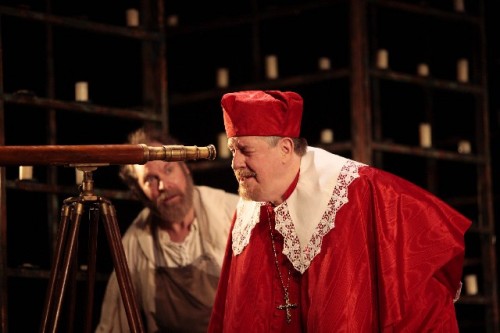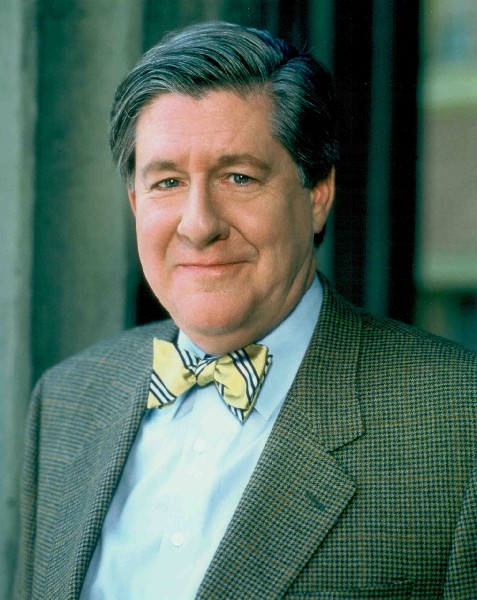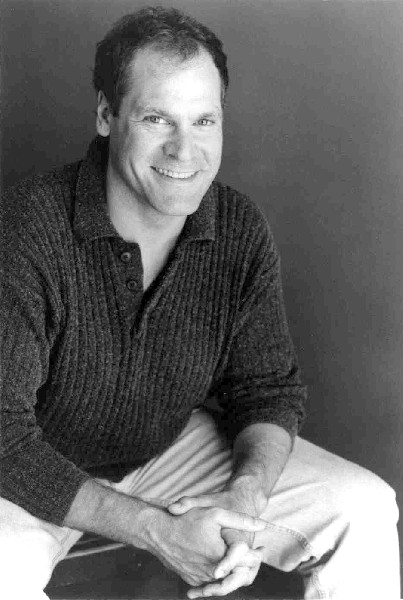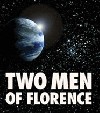Two Men of Florence at Huntington Theatre Co.
Richard Goodwin's Science vs. Religion Smackdown
By: Mark Favermann - Mar 13, 2009
Two Men Of FlorenceWritten by Richard Goodwin
Directed by Edward Hall
Scenic and Costume Design by Francis O'Connor
Lighting Design by Ben Omerod
Sound Design by Matt McKenzie
Music Composed by Alaine Alldaffer
Cast
Bruno, Diego Arcintegas
Cardinal Bellarmine, Peter Van Wagner
Galileo Galilei, Jay O. Sanders
Maria Celeste, Molly Schreiber
Father Benedetto Castelli, Joel Rainwater
Maffeo Barberini/Pope Urban VIII, Edward Hermann
Monsignor Giovanni Ciampoli, Dermot Crowley
Venetian Senators, Diego Arciniegas, Peter Van Wagner, Joe Curnutte, Nat DeWolf
Wackher, B. Landini, Peter Van Wagner
Johannes Kepler, Young Francesco Barberini, Andy Paris
Ambassador Nicollini, Jeremiah Kissel
Grand Duke Cosimo II, Nat DeWolf
Nobleman, Louis XIII and Lorenzo Bernini, Joe Curnutte
Richelieu, Firenzuola and Simplicio, Diego Arciniegas
Ensemble, Teddy Bourgeois
At The Boston University Theatre Mainstage
The Huntington Theater Company
Boston, MA
3/6/09 thru 4/5/09
Everyone learns about Galileo in elementary school. Galileo Galilei (1564-1642) was the genius Tuscan physicist, mathematician, astronomer and philosopher. A pioneer of the Scientific Revolution and The Enlightenment, he is remembered primarily for his work to refine telescopes, observational astronomy and embracing of Copernicanism. He is considered the father of both modern astronomy and physics.
Galileo's Sun centered universe or Copernican heliotropism was in distinct opposition to the earth-centered or geocentric view that dominated since the time of Aristotle. Though extremely religious, Galileo was tried by the Roman Inquisition and forced to recant his theory in favor of the Roman Catholic Aristotelian concept of the universe. Galileo was put under house arrest for the last 10 years of his life by his once friend and supporter Pope Urban VIII. This controversy is the premise of Two Men of Florence.
Richard Goodwin has taken the main characters and added several others to dramatize this philosophical wrestling match. It is a smackdown with no real winner. Furthermore, the match seems to get lost in the heavy and steady barrage of unending verbiage.
Goodwin is known as a prominent wordsmith. He served with distinction under President John F. Kennedy, for President Lyndon B. Johnson, and for Senator Robert Kennedy as a speechwriter, diplomat, and governmental administrator. He was an Assistant Undersecretary of State, Administrator of the Peace Corps and named LBJ's Great Society. After leaving governmental service, he wrote for Rolling Stone, The New Yorker, and published a number of books. He is married to the prominent historian Doris Kearns Goodwin.
It is clear that Goodwin was passionate in his quest to create a play about the challenging fight between scripture and science, the secular and the religious, as personified by this notable historic confrontation. Here there was a heroic fight between the most prominent scientific mind of his day and the most powerful religious leader in the world. But sometimes, a playwright's zealousness is just not enough. The audience should be made to care about a play's characters.
This was a fight about modernism. It was a conflict about control. The Roman Inquisition made a statement. Yet, somehow, the playwright left out the souls of the participants. The words may be beautiful, but the individuals speaking them are not fully formed. There is little passion in the production. Like many too serious religious ceremonies, there is ritual here without very much fervor. It is hard to feel spiritually transformed or even inspired by this play.
The relationship of Galileo to his nun daughter Maria Celeste (Molly Schreiber) seemed very mannered, almost purposely obscure. Surely, the nun at Galileo's home/laboratory heavy handedly suggested the total integration of Roman Catholic religion fully into his life with its scientific study and experimentation. However, unless Galileo spoke words of affection to Maria, and she to him, there is no clear familial relationship. There was other confusion as well. The various priests, monks and many red gowned, bearded cardinals did not add clarity or individual identity. Who were they? It was hard to recognize who was who. Perhaps, with some strong editing, fewer actors and less roles, the play would be stronger, clearer, and more meaningfully engaging.
Two Men of Florence has high production values. The costumes and the set were beautiful. The lighting was elegantly evocative and narratively illuminating. The Huntington Theatre is always very professional in these categories. But, and a big but, the individual characterizations were not absorbing. It is difficult to feel empathy for any of them. The main roles casting was a bit suspect as well. Edward Hermann seemed like a rather too Waspish Italian Cardinal Barberini and later Pope Urban VIII, while Jay O. Sanders seemed too robustly athletic for a bookish, scholarly genius scientist. Though in each case, the performance was strong if not visually and, at times, audibly discordant.
All of the actors were good. The set was good. The script just did not do them justice. Though Goodwin is certainly on to something universal--the conflict between science and religion, scriptural fundamentalism and progressive thought, Two Men of Florence in its current form is a disappointment. There is an important message here though. It is hoped that it can be refined one day to give this powerful idea for a play a soul.







